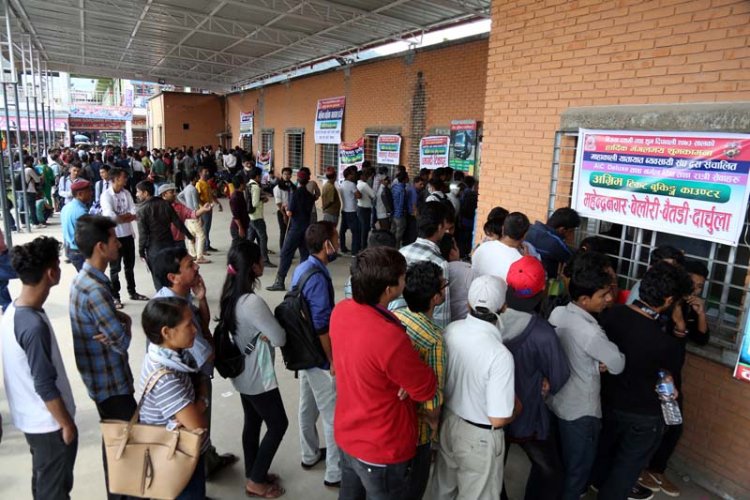Problem of Bus Tickets in Nepal
Highlighting the challenges faced by passengers when purchasing bus tickets in Nepal and proposing solutions to improve the system.

INTRODUCTION
The bus ticketing system in Nepal is a complex and challenging system that requires passengers to purchase tickets in-person at ticket counters or onboard the bus. However, passengers often face long queues, limited availability, and ticket fraud. The system lacks transparency around pricing and ticket availability, and it can be inefficient and prone to errors. While there have been some attempts to modernize the system through online ticketing and electronic payment methods, progress has been slow, and many passengers continue to face difficulties when purchasing bus tickets.
The problems with the bus ticketing system have far-reaching consequences, including increased stress for passengers, reduced efficiency in the transportation system, and potential loss of revenue for transportation companies. Moreover, the lack of reliable and affordable transportation options can have a disproportionate impact on low-income communities and rural areas, where access to transportation is limited.
Efforts to improve the bus ticketing system in Nepal must take into account the unique challenges faced by the transportation industry in the country, including limited resources, infrastructure, and political instability. However, there are still opportunities to improve the system through innovative approaches and collaborative efforts between stakeholders, including transportation companies, government agencies, and technology providers
PROBLEM STATEMENT
1. Long queues at Ticket Counters
It refers to the inconvenience and frustration faced by passengers who have to wait in long lines to purchase their bus tickets. This problem is especially prominent during peak seasons when demand for tickets is high. Long queues can be time-consuming and exhausting, leading to delays and missed opportunities for passengers. Moreover, long queues at ticket counters can also result in overcrowding and a lack of social distancing, especially in the current COVID-19 pandemic situation. The problem of long queues at ticket counters is caused by the limited availability of tickets, insufficient infrastructure and resources, and poor management and organization of ticketing systems. Therefore, implementing solutions such as the expansion of ticket counters and the introduction of online ticketing systems can help to address this problem and improve the overall experience for passengers.
2. Limited availability of tickets, especially during peak seasons
Another major problem faced by passengers when purchasing bus tickets in Nepal is the limited availability of tickets, particularly during peak travel seasons. Due to high demand, tickets may sell out quickly, leaving passengers stranded or with limited transportation options. This can be especially problematic for passengers who need to travel urgently or have tight schedules, as they may not be able to secure a seat on their desired bus.
The limited availability of tickets can also lead to increased ticket prices, as transportation companies may take advantage of the high demand and charge premium prices for remaining tickets. This can create financial strain for passengers, particularly those on a tight budget, and further exacerbate existing social inequalities.
3. Ticket fraud and counterfeit tickets
Another significant problem faced by passengers when purchasing bus tickets in Nepal is the issue of ticket fraud and counterfeit tickets. Unscrupulous individuals may sell fake tickets or use fraudulent means to obtain genuine tickets, which can lead to passengers being denied entry onto the bus or being forced to purchase new tickets at additional cost. This can be a major inconvenience for passengers and can result in financial loss or missed connections.
Additionally, the prevalence of ticket fraud and counterfeit tickets can undermine trust in the bus ticketing system, making it difficult for passengers to know which tickets are genuine and which are fake. This can create confusion and chaos at bus stations, as passengers may argue with bus staff or other passengers over the validity of their tickets.
4. Lack of transparency around pricing and ticket availability
A significant problem faced by passengers when purchasing bus tickets in Nepal is the lack of transparency around pricing and ticket availability. Passengers may struggle to find accurate information about the cost of tickets or which buses have available seats, which can lead to confusion and frustration. This lack of transparency can also make it difficult for passengers to compare prices across different transportation companies or routes, leading to inefficient use of resources and higher overall costs.
In some cases, transportation companies may engage in price discrimination, charging different prices for the same ticket depending on the passenger's perceived ability to pay or willingness to bargain. This can further exacerbate existing social inequalities and make it difficult for low-income individuals to access affordable transportation.
CAUSES OF THE PROBLEMS
1. Insufficient infrastructure and resources
The lack of funding for infrastructure upgrades and maintenance can result in outdated or poorly functioning ticketing systems, limited bus routes, and overcrowded or poorly maintained buses. This can lead to a frustrating and uncomfortable experience for passengers, as well as safety hazards.
Another factor contributing to the problem of insufficient infrastructure and resources is the increasing demand for public transportation services, particularly in urban areas. As the population continues to grow and urbanization accelerates, the demand for public transportation is outpacing the available infrastructure and resources, leading to overburdened systems and inefficient operations.
Furthermore, the lack of coordination and cooperation among transportation companies and government agencies can hinder efforts to address the problem of insufficient infrastructure and resources. Inadequate planning and management can lead to fragmented systems, duplicated efforts, and inefficiencies, further exacerbating the problem.
2. Poor management and organization of ticketing systems
The poor management and organization of ticketing systems in Nepal is a significant issue that contributes to the challenges faced by passengers. One of the primary causes is the lack of clear guidelines and regulations regarding ticket pricing, availability, and distribution. This can lead to confusion and frustration among passengers, as well as creating opportunities for fraudulent activities such as ticket scalping or counterfeit ticket sales.
Additionally, the management of ticketing systems may not be efficient, leading to long wait times, overcrowding, and limited access to tickets during peak travel seasons. There may also be limited options for purchasing tickets, such as relying solely on physical ticket counters, which can be inconvenient for passengers.
Furthermore, the poor management of ticketing systems can also lead to a lack of transparency and accountability. Passengers may not have access to information about ticket availability or pricing, and there may be limited opportunities for feedback or complaints. This can create a sense of distrust and frustration among passengers, leading to a negative perception of the transportation system overall.
3. Lack of proper regulation and oversight
The lack of proper regulation and oversight of bus ticketing systems in Nepal is a significant issue that affects both passengers and the transportation industry as a whole. Without clear guidelines and regulations, there is a risk of fraudulent activities such as ticket scalping, counterfeit ticket sales, and overcharging of passengers.
Furthermore, there may be limited oversight and monitoring of the transportation industry, leading to a lack of accountability and transparency. This can result in a negative impact on the quality of services provided, as well as leading to safety concerns for passengers.
In addition, the lack of proper regulation and oversight can also lead to a lack of coordination and standardization across transportation companies, making it challenging for passengers to navigate the system and leading to a fragmented and inefficient transportation network.
4. Resistance to change and modernization
Resistance to change and modernization is a significant issue in the bus ticketing system in Nepal. Many transportation companies have been slow to adopt new technologies, such as digital ticketing systems, due to a lack of familiarity with these technologies or resistance to change from traditional paper-based ticketing systems.
This resistance to change and modernization has several negative impacts. First, it can lead to inefficiencies in the ticketing process, such as long lines and limited availability of tickets, particularly during peak seasons. This can lead to frustration and dissatisfaction among passengers.
Secondly, the resistance to change can also limit the ability of transportation companies to compete with each other, particularly in the context of an increasingly globalized world where consumers are increasingly accustomed to modern and efficient systems. This can make it difficult for the Nepalese transportation industry to attract new customers, particularly tourists who expect modern and reliable transportation services.
SOLUTION
1. Introduction of online ticketing systems to reduce long queues
One solution to the problem of long queues at ticket counters in Nepal is the introduction of online ticketing systems. By implementing online ticketing systems, passengers can purchase their tickets remotely, without the need to stand in long lines at the ticket counters. This can help reduce congestion at the counters, improve the efficiency of the ticketing process, and provide a more convenient and accessible service to passengers.
Online ticketing systems can also offer additional benefits, such as real-time availability of tickets and the ability to purchase tickets in advance, which can be particularly helpful during peak travel seasons when ticket availability is limited. Additionally, online ticketing systems can provide greater transparency around pricing and ticket availability, which can help address some of the issues around lack of transparency in the current system.
Overall, the introduction of online ticketing systems in Nepal's bus system can help reduce long queues at ticket counters and provide a more efficient and convenient service to passengers.
2. Expansion of the number of ticket counters to improve ticket availability
Another solution to the problem of limited ticket availability in Nepal's bus system is to expand the number of ticket counters. This can help increase the capacity of the ticketing system and reduce the amount of time passengers spend waiting in line.
Expanding the number of ticket counters can be a costly and complex process, but it can provide significant benefits in the long run. By increasing the number of ticket counters, passengers can have greater access to ticketing services, reducing the likelihood of sold-out buses and limited ticket availability. Additionally, this can help to ease congestion at existing ticket counters and reduce waiting times.
To implement this solution, bus companies and government authorities can work together to identify areas where additional ticket counters are needed, and allocate resources to establish new counters. This may involve identifying new locations for ticket counters, hiring additional staff to operate them, and implementing effective management and organization systems to ensure smooth operations.
Overall, expanding the number of ticket counters in Nepal's bus system can improve ticket availability, reduce waiting times for passengers, and help to create a more efficient and convenient ticketing system.
3. Implementation of more advanced technology to prevent ticket fraud and errors
The implementation of advanced technology can be an effective solution to prevent ticket fraud and errors in Nepal's bus system. One such technology is the use of electronic ticketing systems, which are more secure and reliable than traditional paper-based systems.
Electronic ticketing systems use barcodes, QR codes, or other advanced technologies to create unique and tamper-proof tickets. This can help to prevent fraud and ensure that only valid tickets are used to board the bus. These systems also provide real-time data on ticket sales, which can help bus companies to better manage their resources and improve the overall efficiency of the system.
In addition, the implementation of more advanced technology can also help to reduce errors and mistakes in the ticketing process. For example, automated ticketing systems can help to eliminate errors that can occur when manually entering ticket information. This can improve the accuracy of ticket sales data and reduce the likelihood of ticketing errors that can lead to lost revenue and passenger dissatisfaction.
To implement this solution, bus companies and government authorities can invest in the necessary technology infrastructure and equipment, as well as provide training to staff on the proper use of these systems. This may involve significant upfront costs, but can provide significant long-term benefits in terms of improved security, efficiency, and customer satisfaction.
Overall, the implementation of more advanced technology in Nepal's bus ticketing system can help to prevent ticket fraud and errors, improve the overall efficiency of the system, and provide a more convenient and reliable service to passengers.
4. Training of ticketing staff to improve efficiency and customer service
One of the solutions to the problem of bus ticketing in Nepal is to provide training to ticketing staff to improve efficiency and customer service. The staff responsible for selling and distributing tickets must be knowledgeable about the routes, schedules, and fares, as well as be proficient in handling customer queries and complaints.
Training can include a variety of topics such as effective communication skills, customer service, conflict resolution, and the use of new technology. This can help staff to better interact with customers and provide accurate and timely information about ticket availability, schedules, and fares. It can also improve their ability to handle complaints and resolve issues in a timely and satisfactory manner.
In addition to improving customer service, training can also help to improve the overall efficiency of the ticketing system. This can include training on best practices for managing queues, handling cash and card payments, and recording ticket sales data accurately. This can reduce the time customers have to spend waiting in line and increase the speed of transactions.
To implement this solution, bus companies and government authorities can provide training programs to staff, either in-house or through external training providers. This can be an ongoing process to ensure that staff are kept up-to-date with changes in technology, policies, and procedures.
Overall, the training of ticketing staff can help to improve efficiency and customer service in Nepal's bus ticketing system. This can lead to a more satisfying experience for passengers, as well as increased revenue and reduced costs for the bus companies.
5. Increased regulation and oversight of the ticketing system
Another solution to the problem of bus ticketing in Nepal is to increase regulation and oversight of the ticketing system. This can involve implementing stricter guidelines for ticket sales and distribution, as well as ensuring that bus companies comply with these regulations.
One of the main issues with the current ticketing system is the lack of transparency around pricing and ticket availability. By introducing stricter regulations, ticket prices can be standardized and made more transparent, while ensuring that tickets are available to all passengers at a fair price. Additionally, regulations can help prevent the sale of counterfeit or fraudulent tickets, which is a major concern for passengers.
To implement this solution, the government can establish regulatory bodies or commissions to oversee the bus ticketing system. These organizations can set guidelines for pricing and ticket distribution, as well as conduct regular audits to ensure that companies are complying with these regulations. They can also establish penalties for companies found to be violating the rules, which can act as a deterrent for non-compliance.
In addition, the introduction of technology such as electronic ticketing systems can help increase transparency and accountability in the ticketing system. This can provide a record of all transactions, making it easier to track sales and identify any irregularities or fraudulent activity.
Overall, increased regulation and oversight of the ticketing system can help to improve transparency, accountability, and fairness in Nepal's bus ticketing system. By implementing stricter guidelines and monitoring compliance, passengers can be assured of a fair and reliable ticketing system.
6. Standardization of pricing policies to improve transparency and fairness
Standardization of pricing policies is another solution to improve transparency and fairness in Nepal's bus ticketing system. Currently, there is a lack of standardization in ticket prices, and passengers often have to pay different prices for the same route depending on the bus company they choose. This lack of consistency can lead to confusion and mistrust among passengers, as well as unfair competition among bus companies.
To address this issue, the government can establish standard pricing policies for different types of buses and routes, based on factors such as distance, travel time, and amenities offered. This can help to ensure that all passengers are charged a fair and consistent price, regardless of the bus company they choose.
Moreover, standardized pricing policies can also benefit bus companies, as they can reduce the need for aggressive pricing strategies to compete with other companies. This can help to create a level playing field among bus companies and encourage healthy competition based on service quality and reliability.
To implement this solution, the government can work with bus companies and industry experts to establish pricing policies that are fair and practical. The policies can be reviewed and updated periodically to ensure that they remain relevant and effective.
In conclusion, standardization of pricing policies can help to improve transparency, fairness, and healthy competition in Nepal's bus ticketing system. By establishing clear and consistent pricing guidelines, passengers can be assured of a fair and reliable ticketing system, while bus companies can compete on the basis of service quality and reliability.
CONCLUSION
In conclusion, the bus ticketing system in Nepal faces various challenges, including long queues at ticket counters, limited availability of tickets, ticket fraud and counterfeit tickets, lack of transparency around pricing and ticket availability, and insufficient infrastructure and resources. These problems are caused by poor management and organization of ticketing systems, lack of proper regulation and oversight, and resistance to change and modernization. However, various solutions can be implemented, such as the introduction of online ticketing systems, expansion of ticket counters, implementation of advanced technology, and training of ticketing staff, increased regulation and oversight, and standardization of pricing policies. These solutions can greatly improve the bus ticketing system in Nepal and provide a better experience for passengers.
What's Your Reaction?




































































































